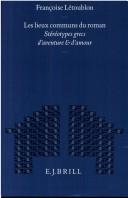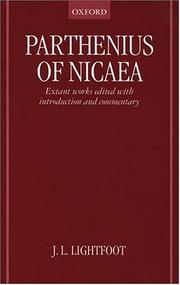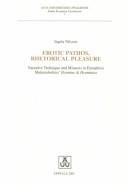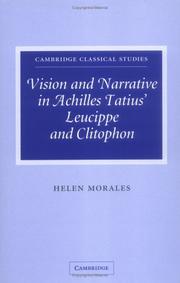| Listing 1 - 8 of 8 |
Sort by
|
Book
ISBN: 3402054108 9783402054109 Year: 1991 Volume: 32 Publisher: Münster: Aschendorff,
Abstract | Keywords | Export | Availability | Bookmark
 Loading...
Loading...Choose an application
- Reference Manager
- EndNote
- RefWorks (Direct export to RefWorks)
Longus --- Love stories, Greek --- Daphnis (Greek mythology) in literature. --- History and criticism. --- Daphnis (Greek mythology) in literature --- -Greek romance fiction --- Greek fiction --- History and criticism --- Longos --- Long --- Longo --- לונגוס --- Λόγγος --- -History and criticism --- Greek romance fiction --- Longus. --- Love stories, Greek - History and criticism.

ISBN: 0521254523 0521041376 1139881582 1107712645 1107714540 1107297958 1107715881 110772001X 9780521254526 9781107297951 9780521041379 Year: 1983 Volume: *82 Publisher: Cambridge: Cambridge university press,
Abstract | Keywords | Export | Availability | Bookmark
 Loading...
Loading...Choose an application
- Reference Manager
- EndNote
- RefWorks (Direct export to RefWorks)
This 1983 book provides a serious modern literary treatment of perhaps the best known of all surviving works of ancient Greek fiction. Dr Hunter demonstrates the sophistication of this pastoral romance, a sophistication which he maintains has often been assumed but never properly discussed. Evidence for the identity of the author and the date of composition are also considered.
Love stories, Greek --- Daphnis (Greek mythology) in literature --- History and criticism --- Longus --- Daphnis (Greek mythology) in literature. --- History and criticism. --- Longus. --- 875-3 --- -875-3 Griekse literatuur: proza --- Griekse literatuur: proza --- Greek romance fiction --- Greek fiction --- Longos --- Daphnis (Mythologie grecque) dans la littérature --- 875-3 Griekse literatuur: proza --- Daphnis --- In literature. --- Love stories, Greek - History and criticism --- Longus. - Daphnis and Chloe --- Romance fiction, Greek --- Dafni --- Dafnis --- Dafno --- Daphnisz --- Δάφνις --- Дафнис --- Дафніс --- דפניס --- Daphnis (Greek mythology)--in literature. --- Romance-language fiction, Greek
Book
ISBN: 0691033412 1306984998 1400863511 069160603X 0691634874 9781400863518 9780691033419 9780691634876 9780691606033 Year: 1994 Publisher: Princeton (N.J.): Princeton university press,
Abstract | Keywords | Export | Availability | Bookmark
 Loading...
Loading...Choose an application
- Reference Manager
- EndNote
- RefWorks (Direct export to RefWorks)
"In the Greek romances," writes David Konstan, "sighs, tears, and suicide attempts are as characteristic of the male as of the female in distress; ruses, disguises, and outright violence in defense of one's chastity are as much the part of the female as of the male." Exploring how erotic love is represented in ancient amatory literature, Konstan points to the symmetry in the passion of the hero and heroine as a unique feature of the Greek novel: they fall mutually in love, they are of approximately the same age and social class, and their reciprocal attachment ends in marriage. He shows how the plots of the novels are perfectly adapted to expressing this symmetry and how, because of their structure, they differ from classical epic, elegy, comedy, tragedy, and other genres, including modern novels ranging from Sidney to Harlequin romances.Using works like Chaereas and Callirhoe and Daphnis and Chloe, Konstan examines such issues as pederasty, the role of eros in both marital and nonmarital love, and the ancient Greek concept of fidelity. He reveals how the novelistic formula of sexual symmetry reverses the pattern of all other ancient genres, where erotic desire appears one-sided and unequal and is often viewed as either a weakness or an aggressive, conquering power. Konstan's approach draws upon theories concerning the nature of sexuality in the ancient world, reflected in the work of Michel Foucault, David Halperin, and John Winkler.Originally published in 1993.The Princeton Legacy Library uses the latest print-on-demand technology to again make available previously out-of-print books from the distinguished backlist of Princeton University Press. These editions preserve the original texts of these important books while presenting them in durable paperback and hardcover editions. The goal of the Princeton Legacy Library is to vastly increase access to the rich scholarly heritage found in the thousands of books published by Princeton University Press since its founding in 1905.
Classical fiction --- Fiction --- Literary form --- Love stories, Greek --- Love stories, Latin --- Sex in literature --- Latin romance fiction --- Latin fiction --- Greek romance fiction --- Greek fiction --- Metafiction --- Novellas (Short novels) --- Novels --- Stories --- Literature --- Novelists --- History and criticism --- Classical influences --- History --- Philosophy --- Sex in literature. --- History and criticism. --- Classical influences. --- Romance fiction, Greek --- Romance fiction, Latin --- Classical fiction - History and criticism --- Love stories, Greek - History and criticism --- Love stories, Latin - History and criticism --- Literary form - History - To 1500 --- Fiction - Classical influences
Book
ISBN: 3760813259 9783760813257 Year: 1986 Volume: 25 Publisher: München: Artemis,
Abstract | Keywords | Export | Availability | Bookmark
 Loading...
Loading...Choose an application
- Reference Manager
- EndNote
- RefWorks (Direct export to RefWorks)
Fiction --- Classical literature --- Classical fiction --- Love stories, Greek --- Love stories, Latin --- Adventure stories, Greek --- Adventure stories, Latin --- History and criticism --- 87-31 --- 87-3 --- -Adventure stories, Latin --- -Classical fiction --- -Love stories, Greek --- -Love stories, Latin --- -Latin romance fiction --- Latin fiction --- Greek romance fiction --- Greek fiction --- Latin adventure stories --- Greek adventure stories --- Klassieke literatuur--?-31 --- Klassieke literatuur: proza --- -Klassieke literatuur--?-31 --- 87-31 Klassieke literatuur--?-31 --- 87-3 Klassieke literatuur: proza --- -87-3 Klassieke literatuur: proza --- Latin romance fiction --- Classical fiction - History and criticism --- Love stories, Greek - History and criticism --- Love stories, Latin - History and criticism --- Adventure stories, Greek - History and criticism --- Adventure stories, Latin - History and criticism

ISBN: 9004097244 9004329196 9789004097247 Year: 1993 Volume: 123 Publisher: Leiden: Brill,
Abstract | Keywords | Export | Availability | Bookmark
 Loading...
Loading...Choose an application
- Reference Manager
- EndNote
- RefWorks (Direct export to RefWorks)
The author uses an extensive study of the five Greek novels preserved by tradition since Roman times (Chariton, Chaireas and Callirhoe , Longus, Daphnis and Chloe , Xenophon of Ephesus, Ephesiaca , Achilles Tatius, Leucippe and Clitophon , Heliodorus, Ethiopica ) to show how the novel form, from its origins, has been based upon the repetition of commonplaces, τόποι, which allows an interplay with the reader. The commonest of these commonplaces, love-Eros, provides the plot of the five novels, in an order which is itself topical: meeting and love at first sight, wounds of love and lovesickness, lovers separated, lovers put to the test by the sea and by pirates, lovers reunited. The heroes of Greek novels, always young, good-looking and well-born (even if their identities are left unclear), allow for easy reader identification. From Xenophon of Ephesus (the most primitive form of the novel) to the Ethiopica (a true work of art), the Greek novel had already explored all the main narrative possibilities of the genre.
Fiction --- Classical Greek literature --- Greek fiction --- Love stories --- Adventure stories --- Roman grec --- Roman sentimental --- Roman d'aventures --- History and criticism --- Translations into French --- Influence --- Histoire et critique --- Traduction en français --- Stéréotype --- --Roman d'amour --- --Roman d'aventure --- --Greek fiction --- Adventure stories, Greek --- Love stories, Greek --- 875-31 --- -Adventure stories, Greek --- -Love stories, Greek --- -Greek romance fiction --- Greek adventure stories --- Greek literature --- Griekse literatuur: roman --- History and criticism. --- -Griekse literatuur: roman --- 875-31 Griekse literatuur: roman --- -875-31 Griekse literatuur: roman --- Greek romance fiction --- Romance fiction --- Traduction en français --- Romances [Greek ] --- Romance fiction, Greek --- Adventure stories, Greek. --- Greek fiction. --- Romance fiction, Greek. --- Roman d'amour --- Roman d'aventure --- Greek fiction - History and criticism --- Adventure stories, Greek - History and criticism --- Love stories, Greek - History and criticism

ISBN: 0198152531 Year: 1999 Publisher: New York Oxford Clarendon Press
Abstract | Keywords | Export | Availability | Bookmark
 Loading...
Loading...Choose an application
- Reference Manager
- EndNote
- RefWorks (Direct export to RefWorks)
Greek literature, Hellenistic --- Love stories --- Elegiac poetry, Greek --- Littérature grecque hellénistique --- Roman sentimental --- Poésie élégiaque grecque --- History and criticism --- Histoire et critique --- Parthenius, --- -Elegiac poetry, Greek --- -Greek literature, Hellenistic --- -Love stories, Greek --- Love stories, Greek --- -Greek romance fiction --- Greek fiction --- Hellenistic Greek literature --- Greek elegiac poetry --- Greek poetry --- Translations into English --- Parthenius of Nicaea --- -Parthenius of Nicaea --- -Criticism and interpretation --- Elegiac poetry, Greek. --- Love stories, Greek. --- History and criticism. --- Translations into English. --- Criticism and interpretation. --- -History and criticism --- Romance fiction --- Littérature grecque hellénistique --- Poésie élégiaque grecque --- Greek romance fiction --- Parteni, --- Partenio, --- Parthénios, --- Parthenios, --- Parthénius, --- Criticism and interpretation --- Greek literature [Hellenistic ] --- Elegiac poetry [Greek ] --- Liefdesverhalen [Griekse ] --- Parthenius, - of Nicaea, - 1st cent. B.C. - Translations into English. --- Parthenius, - of Nicaea, - 1st cent. B.C. - Criticism and interpretation. --- Elegiac poetry, Greek - Translations into English. --- Love stories, Greek - Translations into English. --- Love stories, Greek - History and criticism.

ISBN: 9155449700 9789155449704 Year: 2001 Volume: 7 Publisher: Uppsala: Uppsala university library,
Abstract | Keywords | Export | Availability | Bookmark
 Loading...
Loading...Choose an application
- Reference Manager
- EndNote
- RefWorks (Direct export to RefWorks)
Romance-language literature --- Love stories, Greek --- Littérature romane --- Histoires d'amour grecques --- History and criticism --- History and criticism. --- Histoire et critique --- Eustathius, --- Achilles Tatius. --- Romances, Byzantine --- -Romances, Byzantine --- -875-993 --- 877.3 --- Byzantine romances --- Romances, Greek --- Byzantine literature --- Greek romance fiction --- Greek fiction --- Griekse literatuur: erotische literatuur --- Byzantijnse literatuur --- Eustathius Macrembolites --- Tatius, Achilles --- Achilleus Tatios --- Tatios, Achilleus --- Achilles Tatius Alexandrinus --- Achille Tazio --- Tazio, Achille --- Aquiles Tácio --- Tácio, Aquiles --- Achille Tatios --- Tatios, Achille --- Achille Tatius --- Tatius, Achille --- Ἀχιλλεὺς Τάτιος --- Τάτιος, Ἀχιλλεύς --- Theses --- 877.3 Byzantijnse literatuur --- 875-993 Griekse literatuur: erotische literatuur --- Eumathios --- Macrembolita, Eustazio --- Romance fiction, Greek --- Littérature romane --- 875-993 --- Achilles Tatius --- Romances, Byzantine - History and criticism. --- Love stories, Greek - History and criticism.

ISBN: 0521642647 9780521642644 Year: 2004 Publisher: Cambridge: Cambridge university press,
Abstract | Keywords | Export | Availability | Bookmark
 Loading...
Loading...Choose an application
- Reference Manager
- EndNote
- RefWorks (Direct export to RefWorks)
Love stories, Greek --- Digression (Rhetoric) --- Visual perception in literature. --- Loss (Psychology) in literature. --- Vision in literature. --- Narration (Rhetoric) --- Rhetoric, Ancient. --- Histoires d'amour grecques --- Digression (Rhétorique) --- Perception visuelle dans la littérature --- Perte (Psychologie) dans la littérature --- Vision dans la littérature --- Narration --- Rhétorique ancienne --- History and criticism. --- Histoire et critique --- Achilles Tatius. --- Digression (Rhetoric) in literature --- Visual perception in literature --- Loss (Psychology) in literature --- Vision in literature --- Rhetoric, Ancient --- History and criticism --- Digression (Rhetoric) in literature. --- Eye in literature. --- History --- Romance fiction, Greek --- Digression (Rhétorique) --- Perception visuelle dans la littérature --- Perte (Psychologie) dans la littérature --- Vision dans la littérature --- Rhétorique ancienne --- Eye in literature --- Ancient rhetoric --- Classical languages --- Greek language --- Greek rhetoric --- Latin language --- Latin rhetoric --- Greek romance fiction --- Greek fiction --- Rhetoric --- Discourse analysis, Narrative --- Narratees (Rhetoric) --- Love stories, Greek - History and criticism
| Listing 1 - 8 of 8 |
Sort by
|

 Search
Search Feedback
Feedback About UniCat
About UniCat  Help
Help News
News